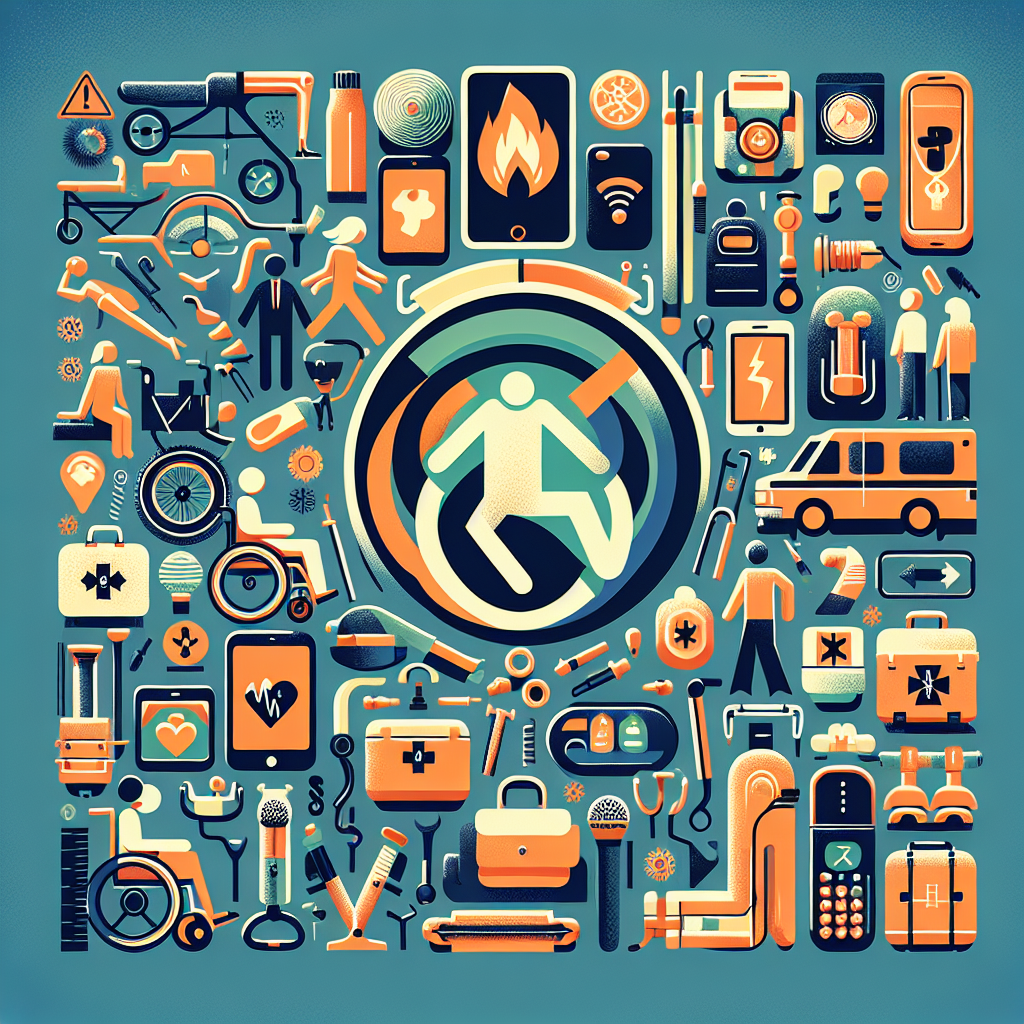Are you prepared for emergencies? From natural disasters to unforeseen accidents, it is important for everyone, including those with disabilities, to have a plan in place. In this article, we will explore the essential steps and considerations necessary for emergency preparedness within the disabled community. Discover how you can stay safe and protect yourself in any emergency situation, ensuring that your unique needs are met and accounted for.
Emergency Preparedness for Disabled
When it comes to emergency situations, it is crucial for everyone to be prepared. However, individuals with disabilities face unique challenges that must be taken into consideration when creating an emergency preparedness plan. By understanding these challenges and taking proactive steps, you can ensure that you are ready to face any emergency situation that may arise.
Understanding the Unique Challenges
It is important to recognize that individuals with disabilities may face additional obstacles during emergency situations. Mobility impairments, sensory issues, mental health conditions, and cognitive disabilities can all impact a person’s ability to respond effectively to emergencies. Therefore, it is vital to tailor emergency plans to accommodate these specific needs.
Creating an Emergency Plan
Developing an emergency plan is the first step towards preparedness. Start by identifying the different types of emergencies that are most likely to occur in your area, such as natural disasters or power outages. Research how these emergencies may impact individuals with disabilities and plan accordingly.
Consider factors such as evacuation routes, shelter accessibility, and communication methods. Make sure you have a clear Evacuation plan in place, including a designated meeting point and a communication strategy. It is also crucial to inform trusted individuals about your emergency plan, so they can assist you if needed.

Building a Support Network
Having a support network in place can greatly enhance your emergency preparedness. Reach out to friends, family, neighbors, and local disability organizations to create a support system. Inform them about your specific needs during emergencies and discuss strategies to ensure everyone’s safety.
Establishing a buddy system can be particularly helpful. This involves coordinating with someone who can assist you in case of emergency, such as evacuating or gathering essential supplies. Regularly communicate with your support network to keep them updated on any changes in your needs or circumstances.
Alert Systems and Communication
During emergencies, timely information is crucial. Explore alert systems that are available in your area, such as text message alerts or emergency notification apps. These systems can provide important updates and instructions during a crisis. Ensure that you are subscribed to receive these alerts and that they are accessible to you.
Effective communication is vital for individuals with disabilities during emergencies. If you have hearing impairments, consider investing in a weather alert radio with visual or vibrating alerts. For individuals with visual impairments, emergency information should be provided in alternative formats, such as braille or large print. Make sure your emergency communication devices are always fully charged and readily available.

Preparing Emergency Supplies
Having a well-stocked emergency kit is paramount for everyone, including individuals with disabilities. Your emergency supplies should include essential items such as water, non-perishable food, medications, vital documents, and personal hygiene items. Consider your specific needs when packing your kit, including items like assistive devices, spare batteries, and communication aids.
Make sure your emergency supplies are easily accessible and stored in a location that is known to everyone in your household. Regularly check and rotate the supplies to ensure they are up to date and in working condition. If you rely on medical equipment that requires electricity or special assistance, consider having a backup plan in place, such as a generator or alternative power source.
Accessible Transportation Options
Transportation can present significant challenges during emergencies, especially for individuals with disabilities. Investigate accessible transportation options available in your area, such as paratransit services or accessible taxi companies. Register for these services in advance so that they can provide assistance when needed.
If you have a personal vehicle, ensure it is properly maintained and consider modifications or adaptations that may enhance its accessibility. If relying on public transportation, familiarize yourself with accessible routes and schedule information. Keep important contact information for accessible transportation providers readily available in case of emergencies.

Evacuation Strategies
Emergency evacuations can be highly stressful, particularly for individuals with disabilities. Develop a comprehensive evacuation strategy that includes preparing for different scenarios. Identify accessible evacuation routes and accessible shelters in your community. Make note of any barriers that may hinder your evacuation and discuss potential solutions with your support network or local emergency management authorities.
Evacuation drills and practicing your plan can greatly enhance your ability to respond effectively during an emergency. This allows you to become more familiar with the evacuation process and address any challenges that may arise. Regularly conduct drills with your support network, ensuring everyone is well-equipped to handle an evacuation situation.
Assistance Animals and Service Dogs
For individuals with disabilities who rely on assistance animals or service dogs, it is important to address their needs specifically in your emergency preparedness plan. Ensure that your emergency supplies include necessary items for your assistance animal, such as food, water, medication, and any specialized equipment.
Research local emergency shelters and accommodations that are pet-friendly and allow for assistance animals. Be prepared to advocate for your rights and provide necessary documentation if required. Additionally, include information about your assistance animal in your emergency plan, including their specific tasks or functions, to ensure that responders are aware of their importance during an emergency.

Inclusion in Community Emergency Planning
Participating in community emergency planning efforts is crucial for individuals with disabilities. Get involved in local emergency preparedness committees or workgroups to advocate for the needs of individuals with disabilities. Share your insights and experiences to help enhance inclusivity and accessibility in emergency planning efforts.
Collaborate with local emergency management authorities to ensure that the plans and resources in place accommodate the specific needs of individuals with disabilities. Provide feedback on emergency drills, training programs, and communication systems to promote greater accessibility and understanding.
Continuous Education and Training
Emergency preparedness is an ongoing process. Stay informed about the latest emergency response procedures and resources available to individuals with disabilities. Regularly review and update your emergency plan and supplies based on changing needs or circumstances.
Seek out training opportunities, such as first aid and CPR courses tailored for individuals with disabilities. This will enhance your ability to respond effectively in emergency situations and empower you to assist others if needed. By continuously educating and training yourself, you can ensure that you are well-prepared to face any challenges that may arise.
In conclusion, emergency preparedness for individuals with disabilities requires careful consideration of their unique needs and challenges. By understanding the specific obstacles they may face, creating a comprehensive emergency plan, building a support network, utilizing alert systems and effective communication, preparing emergency supplies, exploring accessible transportation options, developing evacuation strategies, addressing the needs of assistance animals, advocating for inclusion in community emergency planning, and engaging in continuous education and training, individuals with disabilities can significantly enhance their preparedness for any emergency situation. Remember, being proactive and prepared can make all the difference in ensuring your safety and well-being during times of crisis.






